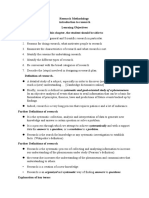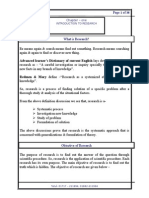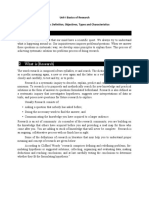Steps in Grounded Theory
Steps in Grounded Theory
Uploaded by
Alexandra SuhlCopyright:
Available Formats
Steps in Grounded Theory
Steps in Grounded Theory
Uploaded by
Alexandra SuhlCopyright
Available Formats
Share this document
Did you find this document useful?
Is this content inappropriate?
Copyright:
Available Formats
Steps in Grounded Theory
Steps in Grounded Theory
Uploaded by
Alexandra SuhlCopyright:
Available Formats
Steps in grounded theory: 1. Research exploring: Why?y Discover the unknown y Investigate the surrounding.
- Research is designed to allow an investigators to just look around with respect to some phenomenon. - The research should endeavor to develop suggested ideas, and the research should be as flexible as possible. Comment in class: It is systematic observation, but it needs to be flexible and open for exploring. - If possible, the research should be conducted in such a way as to provide guidance for procedures to be employed in research activity during stage two. 2. Describe: - The goal at the second stage is to develop careful descriptions of patterns that were suspected in the exploratory research. - This will lead you in your data collecting and your coding . Grounded theory believes in the power of describing things. There is something about grounded researchers, with anthropology. They work hard to put into words social behaviors. The description of reality is what will lead you to the data collecting and coding. Pointers: Data analysis- first you form a code, and then collect a data. Grounded theory- First you collect data, and then you form a code. y y Data collecting- data, tv, archives, database, etc. Coding- numbers. method define the meaning you are investigating On the contrary what we discussed last week in data collecting and coding, this is the way we do it in regular research. In grounded theory that data collecting will be another process and the coding is going to be very different. It will be something that has very few common grounds with regular coding. 3. Explanation: The goal at this third stage is to develop explicit theory that can be used to explain the empirical generalizations that evolve from the second stage. This is a continuous cycle of: -Construction - Testing -Reformulation
The explanation therefore in grounded theory, is what you are describing. The next step would be to explain it. This will be the conclusion in grounded theory. In other regular research the explanation is of your findings. - In basic research you construct your coding, test it, and say if it worked or not. The goal of grounded theory is to push a little further. The third and last step in grounded theory is reformulation. If for instance your hypothesis turns out to be wrong, you suggest another hypothesis for someone to research in the futures. You give tools for someone in the future. Deductive: The researcher begins with a theory which is an explanatory idea. You work from the theory and get an hypothesis from it. General specific Inductive: is the opposite You start with a specific case, and generalize it. Specific case general This is too simple. To do a good grounded theory you will analyze data, and you try to link the data together to see how they relate and explain each other. That is how you get to your theory. All this process is achieved by what we call grounded theory . Pattern- what we call in grounded theory. The goal for you is to find this pattern so you can form this theory. The way you to identify themes and patterns: y What do people consistently talk about in a given social setting? y What aspects of issues are consistently presented in the media? y What concerns are common across several different interviewees. During the research I build up my theory. Not before. Then you constantly add data, and check if the article is relevant to what you are trying to understand. Grounded theory begins with a research situation more than a research question. Your task is to understand what is happening, and how the players manage their roles within the situation. You don t copy your mental framework into the situation, but check the different entities and find the common ground between them (like if you a researching Abu Mazan s speech- you let Israel, the Palestinian authority, etc. exist as it is, and find the relation between them). The goal is to use consistent categories, but also allowing them to emerge from the data. Rather than having a preconceived explanation or idea that misrepresent what is going on. Grounded theory comes from the thought that media coverage is explicating something that is explicit in the world.
You might also like
- Pr1 ReviewerDocument12 pagesPr1 ReviewertaguibebraedenmarkNo ratings yet
- Research Methodology Sem 9Document29 pagesResearch Methodology Sem 9bhavesh shettyNo ratings yet
- Introduction To ResearchDocument8 pagesIntroduction To ResearchApurv AswaleNo ratings yet
- Lecture 01Document77 pagesLecture 01KASHIFNo ratings yet
- Chapter 2Document14 pagesChapter 2William RaveauNo ratings yet
- AMR Complete Notes 11-12-1Document94 pagesAMR Complete Notes 11-12-1Clinton ChrisNo ratings yet
- Research Methods Pad 307Document22 pagesResearch Methods Pad 307ogborugoodluck6No ratings yet
- ReviewerDocument5 pagesReviewerantoineisaiahfNo ratings yet
- RMT Research Methodology and TechniqueDocument6 pagesRMT Research Methodology and TechniqueTashfeen AliNo ratings yet
- Research Methodology Introduction To Research Learning Objectives After Completing This Chapter, The Student Should Be Able ToDocument7 pagesResearch Methodology Introduction To Research Learning Objectives After Completing This Chapter, The Student Should Be Able ToEbong MichaelNo ratings yet
- Communalism and ViolenceDocument38 pagesCommunalism and ViolencemauworksNo ratings yet
- Practical Research 1 Lesson 1Document25 pagesPractical Research 1 Lesson 1begontesjhonrixNo ratings yet
- Research Methodology 1Document15 pagesResearch Methodology 1musicforallcreatorsNo ratings yet
- R.M. NotesDocument37 pagesR.M. NotesAlex BerensonNo ratings yet
- Module 1 Crim 7Document12 pagesModule 1 Crim 7Geronimo BazarNo ratings yet
- Research Methodology NotesDocument56 pagesResearch Methodology NotesNakul Rathi100% (1)
- EdD 601Document31 pagesEdD 601Jessa CagayNo ratings yet
- ACTION RESEARCH NOTESDocument3 pagesACTION RESEARCH NOTESgeophrey kajokiNo ratings yet
- Chapter One ResearchDocument11 pagesChapter One ResearchMegbaru TesfawNo ratings yet
- RM - Class - Notes - 2017Document40 pagesRM - Class - Notes - 2017John KAlespiNo ratings yet
- Research Method Chap 1Document22 pagesResearch Method Chap 1Yaikob MaskalaNo ratings yet
- ScientificDocument25 pagesScientificNida AmmarNo ratings yet
- Research MethodologyDocument6 pagesResearch MethodologyAtiya KhanNo ratings yet
- Unit 1Document13 pagesUnit 1aryantejpal2004No ratings yet
- 4 Researchmethods 110228095551 Phpapp01Document72 pages4 Researchmethods 110228095551 Phpapp01Nguyễn Đức ThiệnNo ratings yet
- 4 ResearchMethodsDocument57 pages4 ResearchMethodssunru24No ratings yet
- Defining A Research ProblemDocument3 pagesDefining A Research ProblemKashifntcNo ratings yet
- Research Methods: Research Is Defined As Human Activity Based On Intellectual Application in TheDocument11 pagesResearch Methods: Research Is Defined As Human Activity Based On Intellectual Application in TheAnuja BeatriceNo ratings yet
- 4phases of Research Process - HanacekDocument22 pages4phases of Research Process - HanacekMichelle Luba OlsenNo ratings yet
- BRM Assignment-4Document23 pagesBRM Assignment-4Sarika AroteNo ratings yet
- Chap. IIDocument35 pagesChap. IIZahra NasreenNo ratings yet
- Advanced Learner's Dictionary of Current English Lays Down The Meaning ofDocument38 pagesAdvanced Learner's Dictionary of Current English Lays Down The Meaning ofMd.Azizul IslamNo ratings yet
- Assignment 1 Research Methods in Mass Communication IDocument19 pagesAssignment 1 Research Methods in Mass Communication IMuhammad Shahbaz DarNo ratings yet
- STA630 Important NotesDocument11 pagesSTA630 Important Notesdopofe8559No ratings yet
- Research Methods HandoutDocument32 pagesResearch Methods HandoutRaldie Atchaso0% (1)
- RSC - Making Sense Study NotesDocument20 pagesRSC - Making Sense Study Notesletlhogonologeorge11No ratings yet
- Summary of The Steps in Preparing The Research PaperDocument35 pagesSummary of The Steps in Preparing The Research PapercamilleicasianoNo ratings yet
- Sarkodie FT Kwabena Kwabena - Odo Menkoaa (2012) : Exploratory ResearchDocument8 pagesSarkodie FT Kwabena Kwabena - Odo Menkoaa (2012) : Exploratory ResearchJohn ArthurNo ratings yet
- Communication StudiesDocument25 pagesCommunication StudiesAnonymous Azxx3Kp9100% (6)
- Meaning of ResearchDocument13 pagesMeaning of ResearchSaurabh PandeyNo ratings yet
- RM Unit-1Document11 pagesRM Unit-1surbhi jhaNo ratings yet
- Written OutputDocument9 pagesWritten OutputAries Badilla VistaNo ratings yet
- The Nature of Research - MAGALLANES ANGEL ROSE - Berzelius 9Document4 pagesThe Nature of Research - MAGALLANES ANGEL ROSE - Berzelius 9Marchelle Rose Ybanez MagallanesNo ratings yet
- Qualitative Research (Links To An External Site.) Quantitative Research. (Links To An External Site.)Document19 pagesQualitative Research (Links To An External Site.) Quantitative Research. (Links To An External Site.)no directionNo ratings yet
- Paper: Grounded TheoryDocument28 pagesPaper: Grounded TheoryMansoure PirgaziNo ratings yet
- Practical Research 1, Week 1Document36 pagesPractical Research 1, Week 1KIP AIZA GABAWANo ratings yet
- Module-1-Lesson-1Document64 pagesModule-1-Lesson-1Trisha AbellanaNo ratings yet
- Business Research Method The Design of ResearchDocument18 pagesBusiness Research Method The Design of ResearchFaisal Raheem ParachaNo ratings yet
- Etymology of ResearchDocument18 pagesEtymology of ResearchmnmrznNo ratings yet
- LLM Research NoteDocument54 pagesLLM Research NoteAnu SharmaNo ratings yet
- MBA Research MtdsDocument241 pagesMBA Research MtdsBarzala CarcarNo ratings yet
- Module 1Document50 pagesModule 1amitbpattarNo ratings yet
- Research Methodology UnitDocument11 pagesResearch Methodology UnitJerin AustindhasNo ratings yet
- Classification of ResearchDocument20 pagesClassification of ResearchJano Baba100% (3)
- Research MethodsDocument56 pagesResearch MethodsAli IrfanNo ratings yet
- A1 - Unit 1A - Nature of Science PDFDocument7 pagesA1 - Unit 1A - Nature of Science PDFMDreamerNo ratings yet
- How To Develop A TheoryDocument8 pagesHow To Develop A TheorynguyenquyhoangNo ratings yet
- Communication Studies Over ViewDocument24 pagesCommunication Studies Over ViewRen HarNo ratings yet



























































